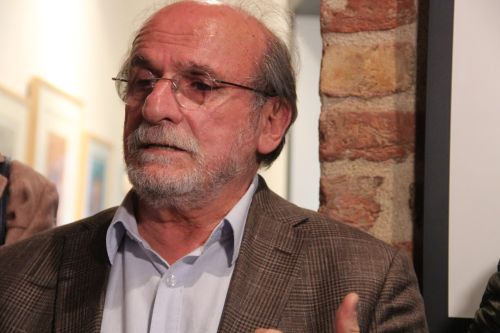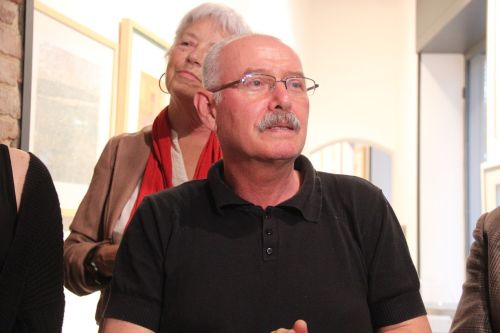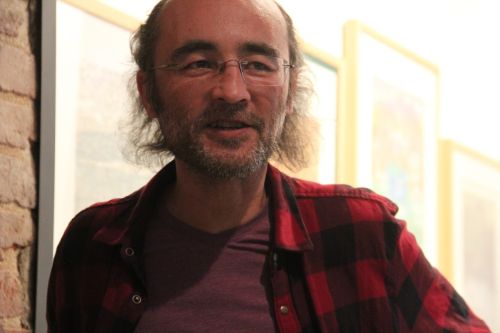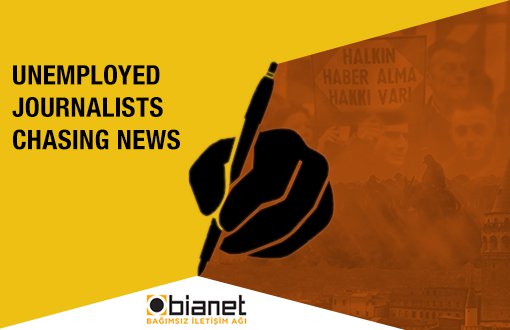Unemployed Journalists Chasing News Project Ends on BİA’s 20th Birthday

Click to read the article in Turkish / Kurdish
The "Unemployed Journalists Chasing News" project carried out by bianet in cooperation with journalists who were left unemployed was completed yesterday (May 3) on the World Press Freedom Day, celebrating also 20th birthday of bianet.
The project has been realized with support of the Consulate General of the Kingdom of the Netherlands the Matra and Human Rights Program. Exclusive file news report were online since April 18 in Turkish, Kurdish and English.
Also 20th birthday of bianet was celebrated yesterday evening. The first meeting initiating the foundation of bianet had been held on May 3 World Press Freedom Day in 1997. Employees, founders of bianet and journalists participating in the project have come together on the occasion of the anniversary.
The web version of the "Peace Journalism Handbook" in English and BİA Media Monitoring Report 2017 January-February-March also went online yesterday on the World Press Freedom Day.
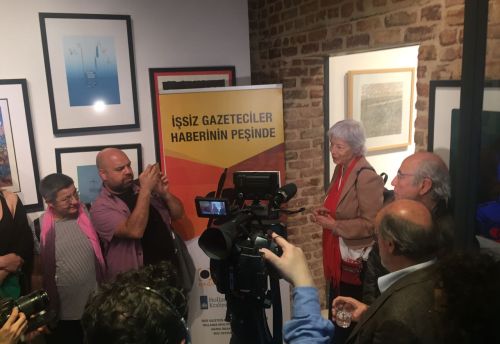
Many journalists, bianet founders as well as Dutch Consul General in istanbul, Robert Schuddeboom were among the guests in Kameleon.
Nadire Mater: We would like to act in solidarity
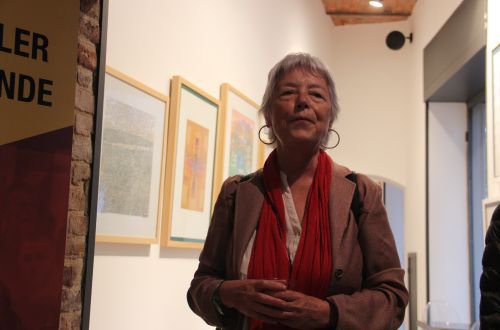
Journalist Nadire Mater, one of the founders of bianet holding the opening speech of the event made some remarks on the project, said that they would like to continue the project and added:
"We came together here today for many different reasons but the most important of all is the project of Unemployed Journalists Chasing News. Today the last new report of the project was published.
"20 colleagues were elected to prepare 10 file reports working in groups of two. We have published the last report today. Doing so, we wanted to act in solidarity with our journalist colleagues left unemployed, and we want to continue this act of solidarity. I would like to thank the Dutch Consulate General and Consul Robert Schuddboom who is here with us today.
Schuddeboom: Our priority is freedom of press
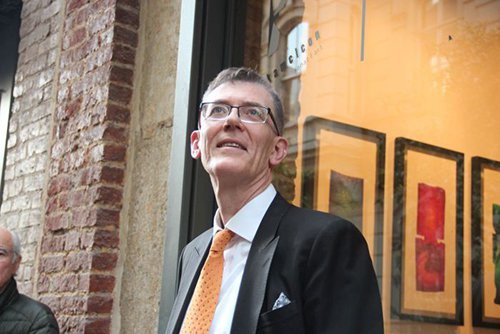
It’s part of the two priorities we have in many countries; one of them is dealing with freedom of press and the other one is LGBT rights. Off course bianet is doing more than that but in this Project proposal these two things came nicely together. So it was not that difficult to say “yes” to this Project.
We really appreciate the possibility given to journalists to write about certain topics.
Michelle Demishevich: "LGBTİ+ journalism made visible"
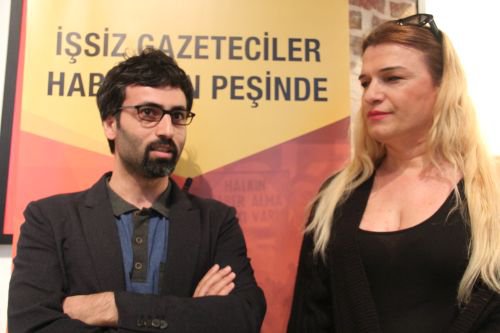
Michelle Demishevich a journalist who had worked on the news file "Trans People" within the project thanked bianet for its gender based approach to journalism and added that the LGBTİ+ journalism was made visible with bianet.
Zana Kibar: "We are the unemployed and the 'other' journalists"
Participating in the project with the "Sur" file, Özgür Gündem daily journalist Zana Kibar said that not the journalists were being killed like in the 90's but journalism was.
"We are actually both the unemployed and the 'other' journalists. We are from the marginalized segment in this society. I am also a Kurdish journalist. It is pleasing to be together in this act of solidarity.
This maybe can be some hope, a slight motion for us.
20th year of bianet
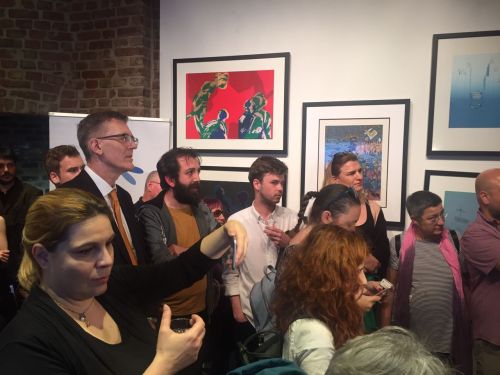
Mater thanked to Human Rights Joint Platform (IHOP) General Coordinator Feray Salman who had been working on the project since its beginning, and Union of Chambers of Turkish Engineers and Architects (TMMOB) Executive Board former member Naci Temeltaş who had made great contributions to initiating the bianet project. Explaining the first formation of bianet 20 years ago and its opening with a police raid on its first day, Mater said:
"Today is the 20th year of us taking the first step towards bianet on May 3, 1997. We had held a conference with local media, independent communicators, academics, journalists, TMMOB, and TTB (Turkish Medical Association). The thing is, the bianet project is a TMMOB project. They contacted me and Ertuğrul Kürkçü to start a project. I tried to keep distant but Ertuğrul was very enthusiastic. Police raided the conference on May 3. So, we started this journey with a police raid. We were accused of organizing an illegal meeting".
Yavuz Önen:
Human Rights Foundation of Turkey Chair Yavuz Önen said:
"In the second half of the 90s, we sought a way to how we can convey the information produced through the professional chambers of the TMMOB to different sections of the society by overcoming the walls of the media of the established system, and that we created a project. The European Commission accepted our project but Brussels rejected it on the grounds that "what the engineers have to do anything with the press". We were told to find a relevant organization. Nadire Mater and Ertuğrul Kürkçü stepped in.
"It was very nice of the TTB to support us. It joined our project, we have to mention their support as well. The European Commission rejected the project again, they stipulated that the union chair vouch for the project. I have warranty in this project, that is why I am here. I thank to all bianet workers and friends who have taken pains for years".
Kürkçü: TBMM must apologize to the journalists
One of the founders of bianet, Peoples' Democratic Party (HDP) MP Ertuğrul Kürkçü apologized to everyone as "an MP who still tries to raise voice of the society at the Grand National Assembly of Turkey (TBMM)".
"I apologize to everyone as we couldn't fulfill our duties. Those who have to be the voice, tongue, needs, desires and speakership of the society in Turkey, are unfortunately responsible for Turkey being given in to dictatorship. We struggled against them but unfortunately this fight is not won yet. In this regards, the TBMM must apologize to the journalists".
Mustafa Sütlaş: It is one of the most beautiful things that the journalists created
"This thing, which started as a duty, continued on voluntary basis until the last three years. I believe we did good things. It was bianet which took reporting and journalism outside of the walls. It has become an occupation for both of those who have been in the struggle since the beginning and who appreciate the news making. It was one of the most beautiful things that the journalists created. I thank to all of those who contributed.
Prof. Dr. Şahika Yüksel: I've benefited a lot from bianet
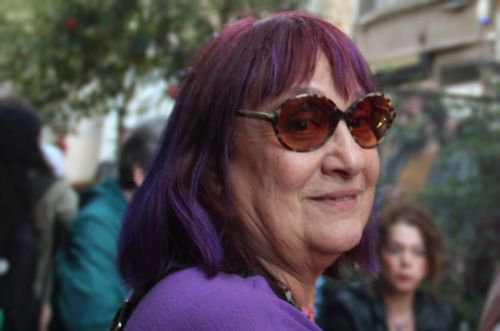
"One day, Murat called and told me that 'a foundation was founded and you will be the founder of it'. I said that I was not a journalist, and he said that they needed a professor. I benefited a lot from bianet. A great media outlet has been established for reports and opinion pieces concerning all feminist, LGBTI+, and torture to be published".
Haluk Kalafat: We believe we can do better
Bianet Co-Editor-in-Chief Haluk Kalafat said that they want to continue the project and they will get better results.
"We've done these articles with 20 people. It was really difficult because it was the first time we did this kind of things. We believe we can do better. We've drawn a road map through this project. I wish we can continue. I thank to you all". (TP/HK/TK/DG)





